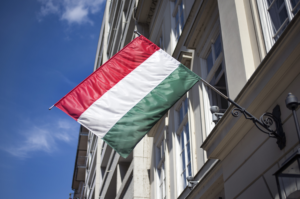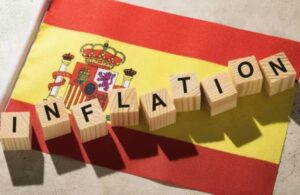
In the period from January to May 2025, inflation in the Netherlands showed moderate growth, remaining above the eurozone average. According to data from Statistics Netherlands (CBS), consumer prices rose by 3.3% in January compared to the same month last year, down from 4.1% in December 2024.
According to the Indeflatie website, the average inflation rate in the Netherlands for 2025 is 3.7%, which is higher than the 3.35% recorded in 2024.
The main factors contributing to inflation are rising prices for housing, water, and energy, as well as an increase in the cost of services due to rising wages.
However, despite moderate inflation, there are external economic risks that could affect the country’s economic situation.
In particular, a possible escalation of trade relations between the US and the European Union could lead to an increase in inflation in the Netherlands by 0.5 percentage points in 2025 and 2026.
Thus, in the first half of 2025, inflation in the Netherlands will remain moderate, but external economic factors could have a significant impact on further price dynamics.
Source: http://relocation.com.ua/inflation-in-the-netherlands/

Economic experts predict a further decline in inflation in Germany in the second half of 2025. The main factors contributing to this are:
Lower energy prices
Stronger euro
Slower wage growth
Lower external demand due to trade tensions
Thus, inflation in Germany in January-May 2025 shows a steady downward trend, approaching the ECB’s target level. This creates the conditions for monetary policy easing and supports expectations of economic stability in the second half of the year.
Impact on monetary policy
The slowdown in inflation in Germany and other eurozone countries is strengthening expectations of interest rate cuts by the ECB. In May 2025, inflation in the eurozone stood at 2.1%, in line with the ECB‘s target.
The ECB is expected to decide at its meeting on June 4–5, 2025, to lower its key interest rate by 0.25 percentage points to 2.0%. This will be the eighth rate cut since June 2024, when it stood at 4.0%.

As temperatures rise and countries back off their decarbonization efforts, we must confront a reality central banks can’t correct
Inflation is, at base, a tax on consumption – and it hits the poor the hardest, since they consume more of their incomes and the rich consume less.
That’s one reason for concern over Donald Trump’s tariffs, which will disproportionately affect the poor. When the 90-day pause on the tariffs expires, it is reasonable to expect prices to rise, and by a lot.
That’s because, first, intermediate goods – rather than finished ones – dominate trade, crossing borders and being tariffed multiple times along the way, which makes them highly inflationary. Second, while the tariffs of the first Trump administration could be more easily absorbed by exchange rates and producers, there is no way tariffs of this magnitude can be absorbed. Producers and consumers must take a hit, and that means rising prices. It looks like the poor, once again, will suffer the most.
But if Trump’s tariffs were to disappear for good, would we return to a world of stable prices? Insights from our forthcoming book, Inflation: A Guide for Users and Losers, suggest that is sadly not the case, for three reasons.
The first is how we think about inflation and how we respond to it. We identified four distinct ways that the public and central banks have talked about the causes and effects of inflation in the past few years. The first story is the textbook idea that “the government spends too much money”. The second focuses on wages pushing up prices – a labor market story. These two stories both see inflation as coming from demand outpacing supply. Consumers demand too much because governments put too much money in their pockets, and workers ask for higher wages despite no significant improvements in productivity. If production can’t keep up with the surge in demand, then the inevitable consequence will be rising prices.
The two other stories we identified see inflation the other way around. It’s the supply side of the economy that generated inflation. There’s the “supply shocks” story, where unexpected events such as Covid or the Ukraine war push up prices and they stay up until the economy adjusts. And finally, there is the story of corporations in concentrated markets using inflation as cover to raise prices.
There is evidence for (and against) all four causal stories. But what policymakers tended to focus on were the first two. As a result, central banks raised interest rates, which can be effective in reducing inflation when it is demand-driven but cannot do much if inflation comes from an exogenous shock, such as Covid or a war.
What is interesting about the 2020s inflation was that the latter two stories – supply shocks and opportunistic corporations – turned out to be just as, if not more, important than the first two.
But is that all there is to future inflation? No, and that brings us to reason number two.
The Trump administration has recently declared a war on climate change research inside the federal government and in the wider US research community, as well as a doubling down on carbon-based business models. But wishing the problem away won’t make it disappear. The real drivers of future inflation are not just tariffs, but the climate crisis and states backing off their decarbonization efforts.
Climate change is already affecting prices. The first driver for this is insurance markets. A combination of massively rising damage costs from droughts, wildfires and floods has seen insurance costs soar in many countries. Some insurers have moved to cut coverage in US states such as California and Florida, with the result that the state there is on the hook for damages it can never cover. Recognizing this, reinsurers – the companies that protect insurance firms – are pulling their coverage from insurance writers, creating a long-term rise in prices. The effects spread well beyond insurance markets. In the US you cannot get a mortgage or build without insurance. Housing is already in critically short supply. Prices can only go up.
The climate crisis is also having long-term effects on what we eat. The Potsdam Institute for Climate Impact Research and the European Central Bank have produced the first systematic assessments of how much climate change will impact inflation through impacts on food supplies. Assuming temperature increases projected through 2035, which are probably understated, food inflation will increase by 0.92 to 3.23% per year, while headline inflation will rise between 0.32 and 1.18% per year. US wildfires and Europe’s recent and persistent droughts and crop failures are really just the thin end of this inflationary wedge.
Finally, there is the question of how everyone else responds to the US breaking the current global order. The UK’s nationalization of a primary steel company, the move to expand Heathrow airport, and more spending on defense all suggest that our attempts to decarbonize our economies are being put on hold in the name of adjusting to these new realities. The US has effectively given up trying to do anything about it and has decided instead to “drill, baby, drill”.
The EU’s Green Deal was already in trouble electorally, and Trump’s decisions have moved the drive for rearmament to the top of the priorities queue. Meanwhile, China’s decarbonization model depends upon everyone else buying its green tech, which itself is built with enormous coal input. Any long-term financial bonus we might get through the lower costs of more installed renewables and lesser climate damage will be much less than anticipated, even a few years ago, as we backpedal on decarbonization.
In short, viewing tariffs as a source of inflation is probably a good idea. But in doing so we should not miss the underlying forces that no amount of central bank tinkering can accommodate – and that we refuse to fully confront.
https://www.theguardian.com/commentisfree/2025/apr/22/tariffs-inflation-climate-crisis
Climate crisis, ECONOMICS, INFLATION, OPINION, Trump tariffs

Experts Club Information and Analysis Center has analyzed the inflation rate in Hungary and its trends in Hungary in recent years. Inflation in Hungary in 2025 continues to decline after record highs in 2022-2023. As of March 2025, annual inflation stood at 4.7%, down from 5.6% in February.
The main drivers of inflation
The decline in inflation is due to stabilizing food and energy prices. However, rising rental prices and services continue to put pressure on the overall price level
Government and central bank measures
The central bank of Hungary maintains the key interest rate at 6.5% to contain inflationary pressures. The government is taking steps to control prices in key sectors of the economy.
Outlook
Experts expect inflation to continue to decline to around 3.5% in 2026, approaching the central bank’s targets
Year Inflation (%)
2000 9,79
2001 9,15
2002 5,26
2003 4,66
2004 6,75
2005 3,56
2006 3,90
2007 7,95
2008 6,06
2009 4,20
2010 4,87
2011 3,93
2012 5,66
2013 1,71
2014 – 0,23
2015 -0,07
2016 0,40
2017 2,35
2018 2,84
2019 3,37
2020 3,33
2021 5,11
2022 14,61
2023 17,13
2024 3,8
2025 4.7 (March)

Experts Club Information and Analytical Center has analyzed the inflation rate and its trends in Romania in recent years. Inflation in Romania in 2025 continues to show a moderate decline, while remaining above the National Bank’s target level. According to the National Institute of Statistics, in March 2025, annual inflation amounted to 4.86%, down from 5.02% in February.
Main components of inflation in March 2025.
Food products: price increase by 5.10%
Non-food products: increase by 3.84%
Services: up 6.99%
The greatest pressure on the overall price level is exerted by services, especially health care, education and utilities.
Historical inflation dynamics
To understand current trends, let’s look at the inflation rate in Romania in recent years.
2021: 5.05%
2022: 13.80%
2023: 10.40%
2024: 5.60%
These data show a significant increase in inflation in 2022, driven by global economic turmoil, and a gradual decline thereafter.
According to the European Commission’s forecasts, inflation in Romania is expected to continue to decline, reaching 3.4% by the end of 2025. However, risks related to fiscal policy and possible changes in tax legislation remain.
Romania’s central bank is taking a cautious approach, aiming to reduce inflation without damaging economic growth. With upcoming elections and increased public spending, the scope for further interest rate cuts is limited.

In Spain, according to the National Institute of Statistics (INE), annual harmonized inflation in March 2025 fell to 2.2% from 2.9% in February, the lowest rate in the last five months and below the forecast of 2.6%. The decline in inflation was driven by a drop in electricity prices due to increased hydropower production following heavy rainfall, as well as lower prices for fuel and motor oil.
Core inflation, which excludes fresh food and energy prices, also fell to 2.0% year-on-year, reaching its lowest level since November 2021.